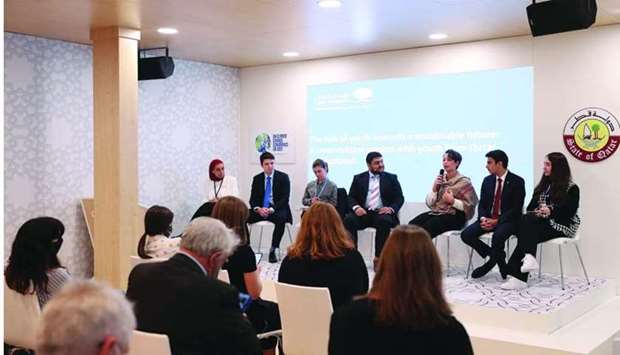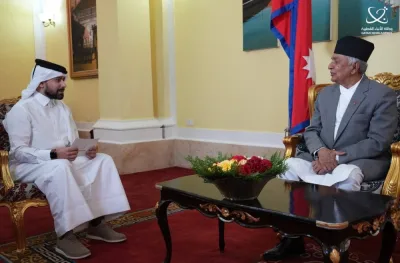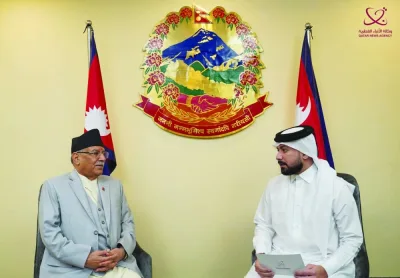Young activists from Qatar have called for climate education to be part of academic curricula, at the COP26 global climate change conference in the UK.
Members of Thimun Qatar – a Model United Nations initiative under Qatar Foundation’s (QF) Pre-University Education – also spoke of their fears that youth are being “acknowledged but not listened to” on climate change.
Three students from Qatar joined young activists from Scotland in two cross-cultural discussions focusing on why the world’s youth need to be at the forefront of climate action efforts. Thimun Qatar representatives were among the young people who developed a pre-COP26 manifesto for tackling climate change at the Youth4Climate summit in Milan last month.
Among the Thimun Qatar speakers was the initiative’s secretary general, Giulia Pinna, who told the COP26 audience: “We – the youth – have contributed so much to climate action, so it’s a question of why we aren’t being taught about the climate crisis in formal education.
“By embedding climate education in formal curricula, young people will be empowered to act and start change; it’s a great way of motivating them to take action. They need to be shown the specific impact of this global issue on their local communities, its relevance to their homes, the urgency of it, and why it’s important for them to actively contribute to finding solutions.”
According to Sama Ayoub, deputy president of the Thimun Qatar General Assembly and a student of Weill Cornell Medicine-Qatar, youth need to be “taken seriously” on climate change and “the world needs to believe in us as we believe in ourselves”.
Thimun Qatar student officer, Abdallah al-Darwish told the cross-cultural session: “One of the biggest challenges young people will face is finding the right resources, education, and support to take the action they want to take.
“At Thimun Qatar, we have these resources because of QF. But across the world, we need more QFs, more resources, and more educators to go into the community and help young people take their climate action projects forward, to the point where they become reality and their goals are accomplished.”
During COP26, Pinna also participated in a session on the need for climate literacy, saying: “If you speak to just a couple of young climate activists, they will come up with things nobody has ever come up with before and that world leaders will open their mouths in surprise at.”
In a COP26 side event on climate education and youth empowerment, Aysha al-Mudahka, director, Strategic Initiatives and Partnership Development, QF, said: “It’s very important to give students the right platforms and engage them from an early age, by providing the right ecosystem.
“Empowering young people comes from education, but also by providing them with the skills they need to create their own startups; to create something that is their passion, whether it may be a social enterprise or a clean tech business.”
Houriya Ahmed, director of QF’s Policy Hub, told delegates at a COP26 session on the role of education and research in supporting climate action in Qatar: “Our schools at QF are focused on developing the knowledge, skills, attitudes, and behaviours for our students to think critically and develop solutions toward more sustainable patterns of living, and ensuring there is an interface with nature.”
Three students from Qatar joined young activists from Scotland in two cross-cultural discussions focusing on why the world’s youth need to be at the forefront of climate action efforts. Thimun Qatar representatives were among the young people who developed a pre-COP26 manifesto for tackling climate change at the Youth4Climate summit in Milan last month.
Among the Thimun Qatar speakers was the initiative’s secretary general, Giulia Pinna, who told the COP26 audience: “We – the youth – have contributed so much to climate action, so it’s a question of why we aren’t being taught about the climate crisis in formal education.
“By embedding climate education in formal curricula, young people will be empowered to act and start change; it’s a great way of motivating them to take action. They need to be shown the specific impact of this global issue on their local communities, its relevance to their homes, the urgency of it, and why it’s important for them to actively contribute to finding solutions.”
According to Sama Ayoub, deputy president of the Thimun Qatar General Assembly and a student of Weill Cornell Medicine-Qatar, youth need to be “taken seriously” on climate change and “the world needs to believe in us as we believe in ourselves”.
Thimun Qatar student officer, Abdallah al-Darwish told the cross-cultural session: “One of the biggest challenges young people will face is finding the right resources, education, and support to take the action they want to take.
“At Thimun Qatar, we have these resources because of QF. But across the world, we need more QFs, more resources, and more educators to go into the community and help young people take their climate action projects forward, to the point where they become reality and their goals are accomplished.”
During COP26, Pinna also participated in a session on the need for climate literacy, saying: “If you speak to just a couple of young climate activists, they will come up with things nobody has ever come up with before and that world leaders will open their mouths in surprise at.”
In a COP26 side event on climate education and youth empowerment, Aysha al-Mudahka, director, Strategic Initiatives and Partnership Development, QF, said: “It’s very important to give students the right platforms and engage them from an early age, by providing the right ecosystem.
“Empowering young people comes from education, but also by providing them with the skills they need to create their own startups; to create something that is their passion, whether it may be a social enterprise or a clean tech business.”
Houriya Ahmed, director of QF’s Policy Hub, told delegates at a COP26 session on the role of education and research in supporting climate action in Qatar: “Our schools at QF are focused on developing the knowledge, skills, attitudes, and behaviours for our students to think critically and develop solutions toward more sustainable patterns of living, and ensuring there is an interface with nature.”



